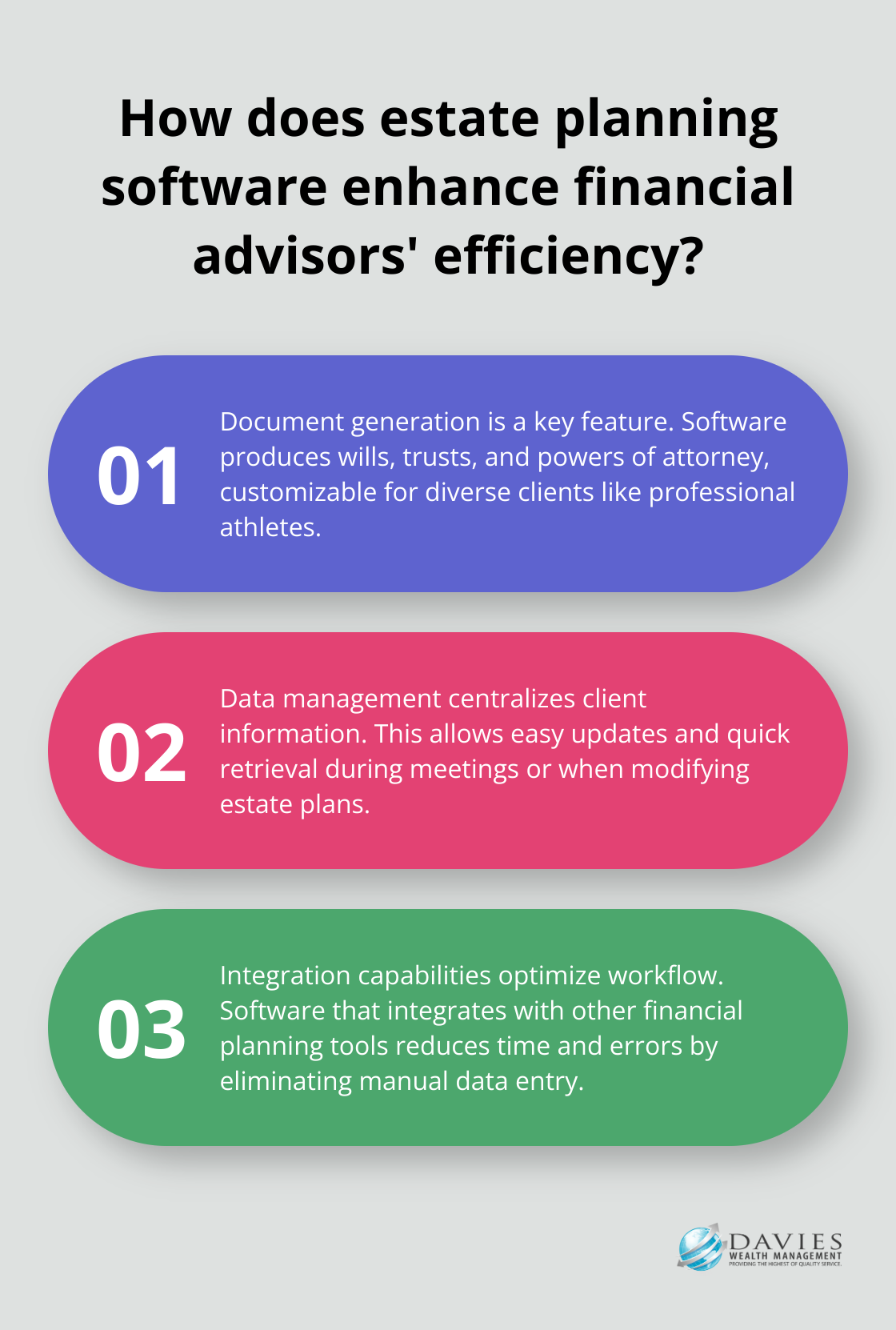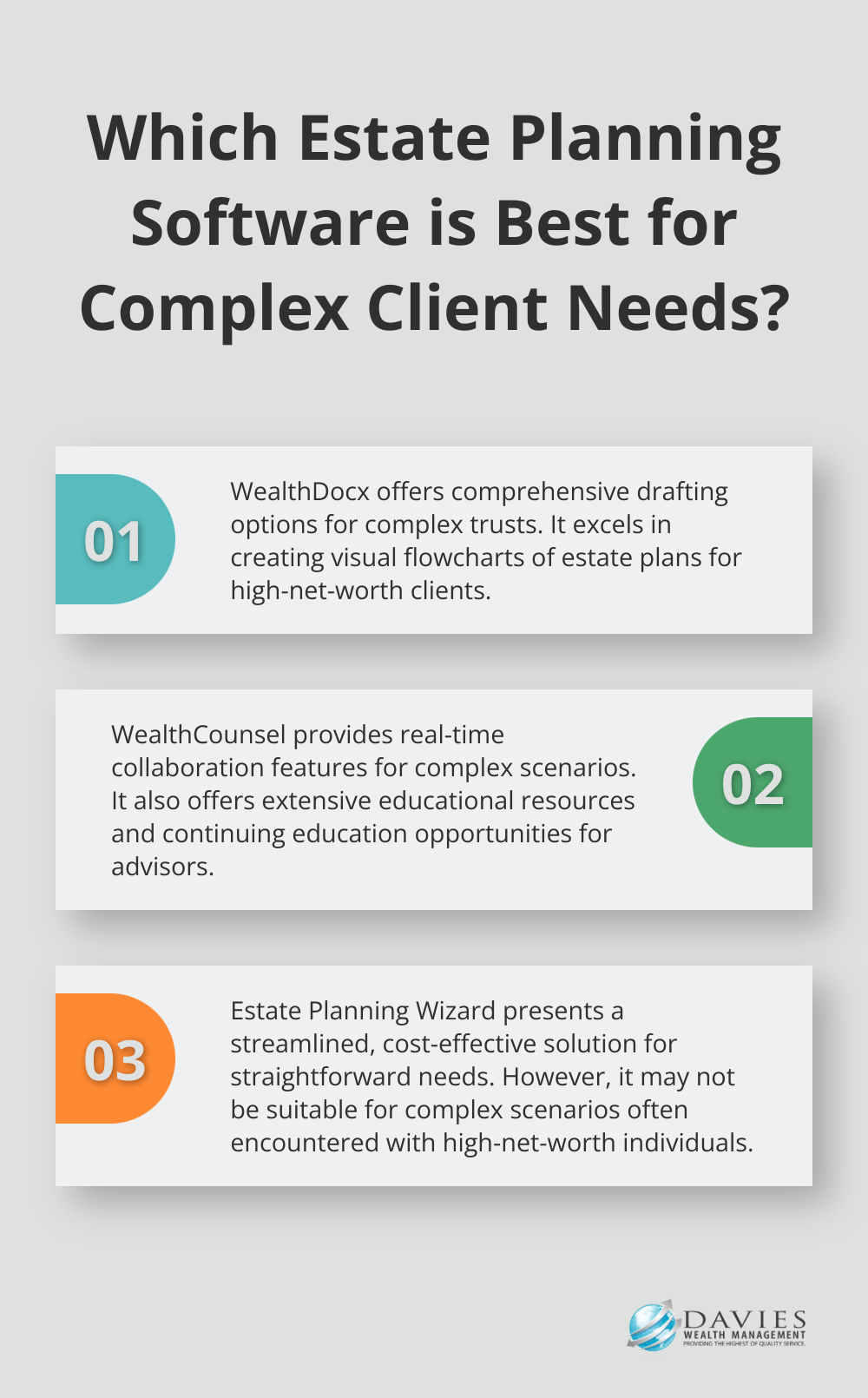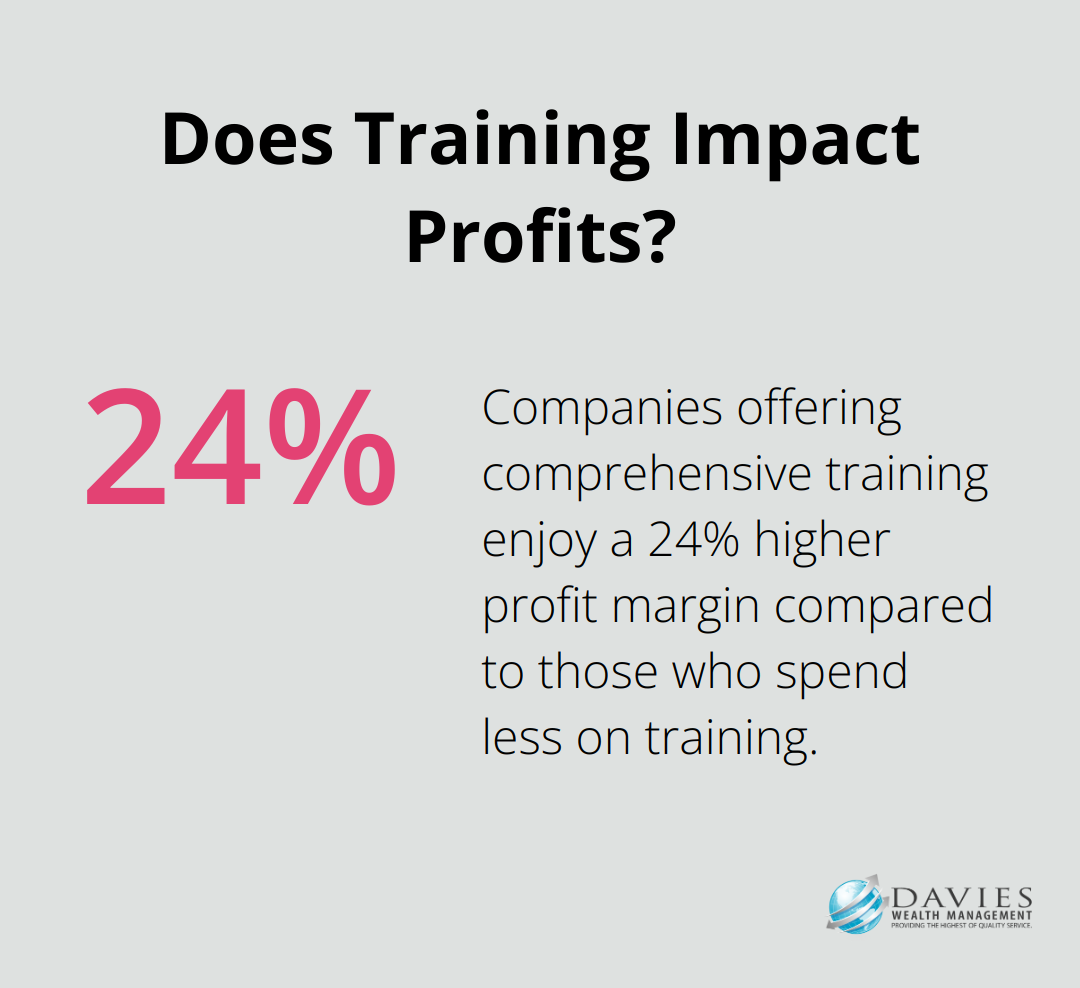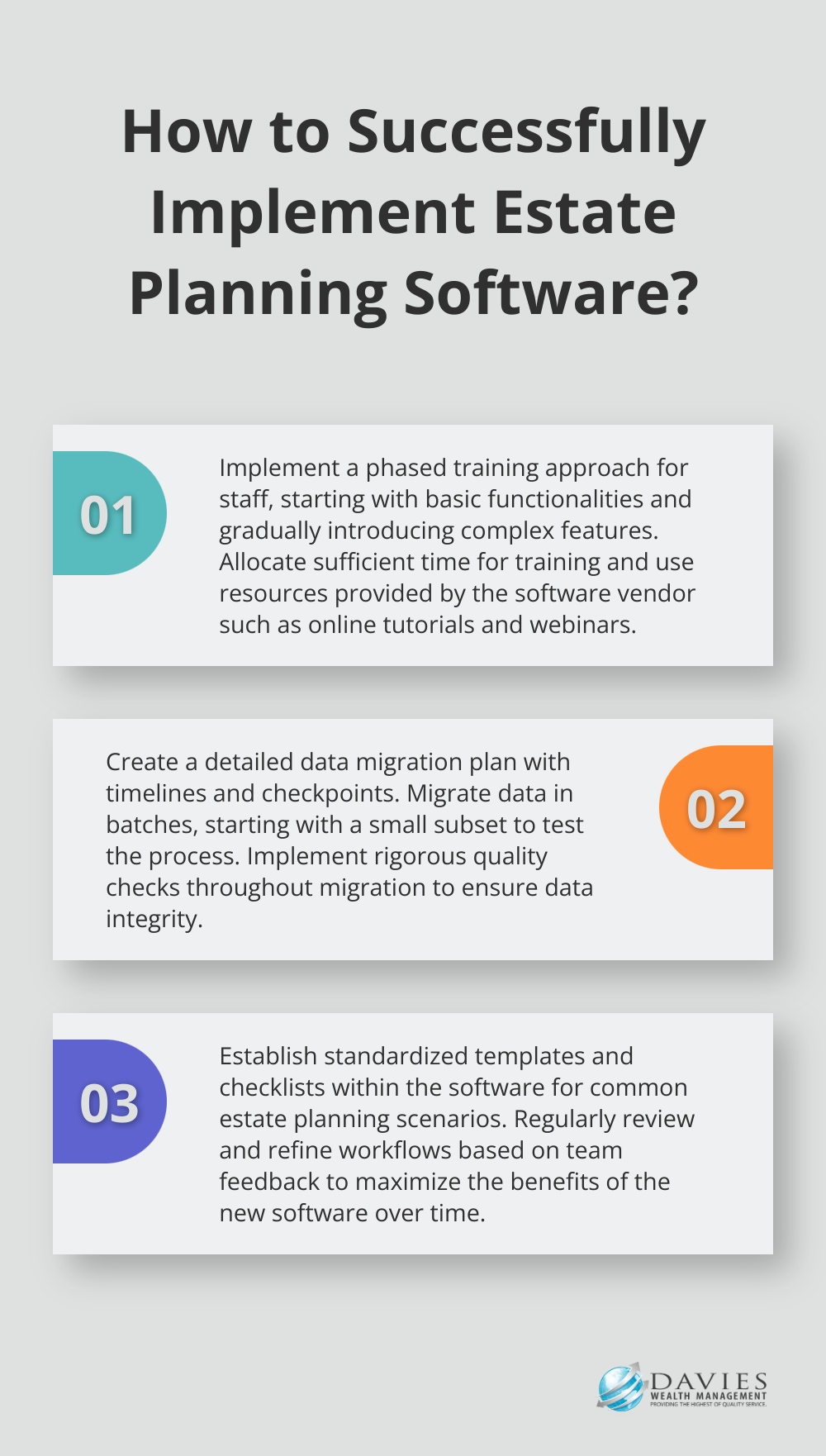At Davies Wealth Management, we understand the importance of efficient estate planning for financial advisors. Selecting the right estate planning software can streamline your processes and enhance client service.
In this post, we’ll explore key features to look for in estate planning software for financial advisors, compare top options, and discuss implementation strategies.
By the end, you’ll have a clear understanding of how to choose the best solution for your practice.
Key Features to Look for in Estate Planning Software
At Davies Wealth Management, we understand the importance of selecting the right estate planning software for financial advisors. The proper solution can transform how you approach estate planning for your diverse clientele, including professional athletes with unique financial situations.
Document Generation and Customization
The foundation of any estate planning software is its ability to produce comprehensive, accurate legal documents. Estate planning software offers a wide range of document types, including wills, trusts, powers of attorney, and healthcare directives. The software should enable easy customization to address the specific needs of each client. For example, when working with professional athletes, you often need to create complex trusts to manage substantial assets and fluctuating incomes.
Robust Data Management
Effective client data management is essential. The software should provide a centralized database for storing and organizing client information, allowing easy updates and access to data as needed. This feature proves particularly valuable when dealing with high-net-worth individuals or clients with complex financial situations (it allows for quick retrieval of information during client meetings or when updating estate plans).
Seamless Integration Capabilities
To optimize your workflow, choose software that integrates well with other financial planning tools you use. This integration can reduce time and errors by eliminating the need for manual data entry across multiple platforms. For instance, integration with financial planning software can automatically update asset values in estate planning documents, ensuring accuracy and saving valuable time.
Stringent Security and Compliance Measures
Given the sensitive nature of estate planning information, robust security features are non-negotiable. Select software that offers end-to-end encryption, multi-factor authentication, and regular security audits. Additionally, ensure the software complies with relevant regulations such as GDPR or CCPA, depending on your jurisdiction.
Financial advisor compliance trends to watch in 2025 and beyond include recordkeeping, pay to play, cybersecurity, and artificial intelligence.

These key features will help you select estate planning software that not only enhances your practice’s efficiency but also provides the level of service and security your clients expect. The right software should adapt to your specific needs, whether you’re serving individual clients, families, or professional athletes with complex financial portfolios.
Now that we’ve covered the essential features to look for in estate planning software, let’s compare some of the top options available in the market.
Top Estate Planning Software Comparison
At Davies Wealth Management, we’ve evaluated various platforms to determine which ones best serve our clients’ needs, including professional athletes with complex financial situations. Here’s our breakdown of four popular estate planning software options:
WealthDocx: Comprehensive and User-Friendly
WealthDocx7 includes drafting options for wills, revocable living trusts, irrevocable trusts, partnership agreements, limited liability company (LLC) operating agreements, and more. It provides state-specific templates and regular updates to reflect the latest legal requirements. This software excels in creating complex trusts, which proves particularly useful for high-net-worth clients or those with unique financial situations (such as professional athletes).

One of WealthDocx’s strengths is its ability to generate visual flowcharts of estate plans, which can significantly help when explaining complex structures to clients. However, it’s important to note that while powerful, WealthDocx may have a steeper learning curve compared to some other options.
WealthCounsel: Collaborative and Educational
WealthCounsel’s customizable software allows you to securely access your files in real time to collaborate anytime, anywhere. This feature proves particularly valuable when handling complex estate planning scenarios that require input from multiple experts.
What distinguishes WealthCounsel is its emphasis on education. The platform provides extensive resources and continuing education opportunities for advisors. This can benefit those who want to deepen their estate planning knowledge or stay updated on the latest industry trends.
Estate Planning Wizard: Streamlined and Cost-Effective
Estate Planning Wizard offers a straightforward approach to document creation for advisors seeking a more streamlined solution. Its user-friendly interface guides users through a series of questions to generate appropriate documents.
While it may not offer the same level of customization as some other platforms, Estate Planning Wizard can serve as a cost-effective option for advisors who primarily work with clients with straightforward estate planning needs. However, it may not suit those dealing with complex scenarios often encountered with high-net-worth individuals or professional athletes.
Practical Planning System: Scenario-Based Planning
Practical Planning System takes a unique approach by focusing on scenario-based planning. This software allows advisors to model different estate planning scenarios and compare their outcomes, which can prove particularly useful when working with clients who have complex financial situations or multiple potential beneficiaries.
One of the standout features of Practical Planning System is its ability to generate detailed reports that clearly illustrate the impact of different estate planning strategies. This can provide invaluable assistance when explaining complex concepts to clients or demonstrating the value of certain estate planning decisions.
While each of these software options has its strengths, the best choice depends on your specific needs as an advisor and the types of clients you serve. A combination of robust features, ease of use, and the ability to handle complex scenarios is essential (especially when working with professional athletes and high-net-worth individuals).
The right estate planning software should enhance your ability to provide personalized, comprehensive service to your clients. It’s not just about document generation – it’s about having the tools to create tailored estate plans that truly meet your clients’ unique needs and goals.
Now that we’ve explored the top estate planning software options, let’s discuss how to effectively implement these tools in your financial planning practice.
Implementing Estate Planning Software in Your Practice
Staff Training and Onboarding
The first step to successful implementation of estate planning software is comprehensive staff training. Identify key users who will work with the software most frequently. These individuals should receive in-depth training and potentially become in-house experts to support other team members.

A phased training approach works best. Start with basic functionalities and gradually introduce more complex features. This method prevents staff overwhelm and allows for better information retention. Many software providers offer online tutorials, webinars, or on-site training. Use these resources to fully prepare your team.
Allocate sufficient time for training. A study found that companies offering comprehensive training enjoy a 24% higher profit margin compared to those who spend less on training. This investment in your team’s skills will yield long-term benefits.
Data Migration Process
Migrating existing client data to your new estate planning software requires meticulous planning. Start with a thorough audit of your current data. Identify the information that needs transfer and the format required by the new software.
Create a detailed migration plan that includes timelines, responsible team members, and checkpoints. It’s often beneficial to migrate data in batches, starting with a small subset to test the process before moving to larger volumes.
Data integrity is paramount during this process. To avoid contributing to poor data quality, implement rigorous quality checks throughout the migration process. This might include manual spot-checks, automated data validation tools, or even hiring a third-party data migration specialist for large-scale operations.
Establishing Efficient Workflows
After team training and data migration, focus on creating efficient workflows within the new software. Map out your current estate planning processes. Identify areas where the new software can streamline operations or automate manual tasks.
Create standardized templates and checklists within the software for common estate planning scenarios. This ensures consistency across your practice and saves time.
Review and refine your workflows regularly. Encourage feedback from your team on what works well and what needs improvement. This iterative approach will help you maximize the benefits of your new estate planning software over time.
Continuous Improvement and Adaptation
Implementing new software is not a one-time event but an ongoing process. Encourage continual learning and adaptation among your team. Schedule regular check-ins to discuss software usage, address any challenges, and share best practices.
Stay informed about software updates and new features. Many estate planning software providers release updates that can enhance functionality or address emerging industry needs. Make sure your team is aware of these updates and understands how to leverage new features effectively.
Consider appointing a “software champion” within your team. This person can serve as the main point of contact for software-related queries, coordinate training sessions, and liaise with the software provider when necessary. For more financial planning strategies and insights, explore our resources to enhance your practice’s capabilities.
Final Thoughts
Estate planning software for financial advisors offers significant advantages to practices seeking efficiency and client satisfaction. The ideal solution provides comprehensive document generation, robust data management, seamless integration, and stringent security measures. These features enable advisors to handle complex estate planning scenarios effectively, particularly when working with high-net-worth individuals or professional athletes.

At Davies Wealth Management, we recognize the importance of tailored financial solutions for clients with unique financial challenges. We encourage advisors to evaluate software options based on their practice’s specific needs, considering client demographics, team size, and integration requirements. Implementing new software represents an investment in your practice’s future (and requires careful consideration and planning).
For more information on how we can assist you with estate planning and comprehensive wealth management solutions, visit Davies Wealth Management. Our team stands ready to help you navigate the complexities of financial planning and secure your clients’ financial futures.



Leave a Reply